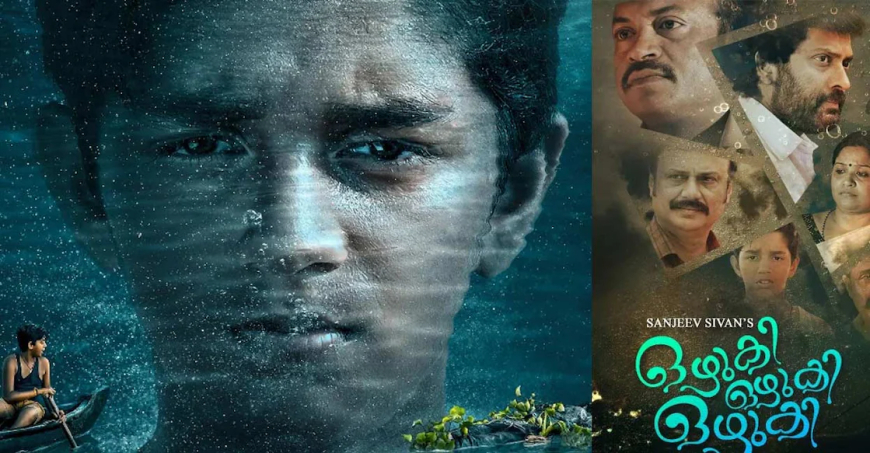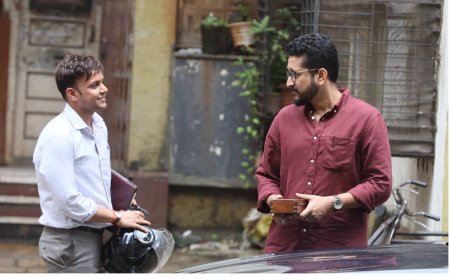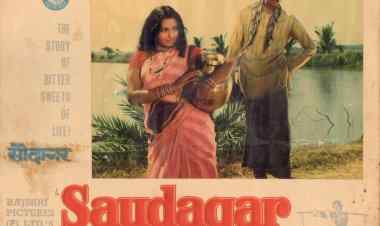Ozhuki Ozhuki Ozhuki : A brilliant ode to disappearing dead bodies
Dr. Shoma A. Chatterji provides a insightful review of a beautiful Malayalam film OZHUKI OZHUKI OZHUKI directed by Sanjeev Sivan of the Sivan family.

Sanjeev Sivan is a low-key, extremely gounded director of Kerala. He made his directorial debut with the Malayalam feature film Aparichitan which was a sleeper hit. The film is said to have changed the face of the Kerala film industry in a very positive and outstanding way. His next film Venalodungathe bagged the Best Film Award at the Hidden Gems International Film Festival at Calgary in Canada. He has also worked on various documentary projects for international production companies and foreign television.
His latest film Ozhuki, Ozhuki, Ozhuki (Quiet Flows the Dead) in Malayalam, is dedicated to the nameless corpses that float down rivers across the world without getting a proper farewell from their loved ones. The agenda is never loud or disturbing because the narrative throws up the perspective on life and death through the eyes and mind of the 12-year-old Paakaran who lost his father one day to the river that flows through his village in Kerala. The older man’s body was never found and therefore, the funeral rites remain undone.
Paakaran lives with his mother who works in a shrimp shelling outfit in the backwaters of Kuttanad in Kerala. He is a very happy-go-lucky boy who hates studies and wants to be a helmsman on a boat and spend his life sailing boats on the river when he grows up. Paakaran is adored by the villagers, a small village where everyone knows everyone else and Paakaran is the go-to boy for cutting coconuts, and doing every kind of chores for everyone in the village and is forever beckoned by them to do this and that.
The only nightmare that haunts the small Paakaran is that his father’s funeral rites could never be performed because his body was never found. He often gets into the river and discovers floating dead bodies that remain unclaimed and therefore, are denied funeral rites which are supposed to liberate the souls of the dead. Some of the elders such as the police constable at the local police station take advantage of his good and generous nature but he does not mind because basically, he is a very good boy. He hardly attends school but meets his school friends on their way to school and back and plays with them.
He often goes sailing in the river and is deeply disturbed by floating dead bodies that remain unclaimed and are deprived of a cremation and funeral rites. Once, in the middle of the night, he creeps out of bed and while sailing, discovers a floating corpse, drags it to the shore, digs a big hole and buries the body. The entire village is worried about his missing in the middle of the night but then admires Paakaran’s kind-hearted and selfless gesture.
Sanjeev Sivan’s son Sidhangshu’s debut performance as Paakaran, is brilliant. He has been able to realise the innocent look of a 12-year-old boy, confused about the ways of the world such as the policeman snatching his catch of fish and also visiting the sex worker in the village, why they are so very poor, why his mother has to work in the shrimp shelling workshop and so on. Every actor has done extremely well in melting into the scenario, which invests the ambience with an other-worldly feeling, minus the cacophony, the jostling crowds, the violence that dots the lives of people in the city.
The film is based on the short story ‘Who’ by the late Malayalam lyricist and poet Beeyar Prasad, also known as B Rajendraprasad who passed away at a young age before the film was released. Says director Sanjeev Sivan. “I was attracted to this story for two reasons. One is that it talks about the global issue of unidentified bodies floating in waters. Secondly, this complex story is told from a child’s point of view. It was a challenging character for Sidhanshu. But he underwent an intensive training workshop.”
Sanjeev Sivan’s wife, Deepti Pillay Sivan, a filmmaker herself, has produced the film under their family banner of Tripod Motion Pictures. Apart from the script and the narration, the film will be remembered for its sheer visual beauty including its sound and music and editing which lifts the film to a different dimension altogether. The vegetable ‘market’ sailing in on a boat, dead bodies floating away without being claimed by anyone, the mother rushing off to work at the fishing cooperative, Paakaran’s bewildered and sad expression as he watches a claimed dead body’s last rites being performed on the village bank sadly, remembering his father having disappeared into the waters of the river they love so much.
About picking up her son to play the protagonist Paraakan in the film, his mother, Deepti Pillay Sivan says, “We decided to cast Sidhanshu in the movie since when he was six, he went on saying that he wanted to be an actor. We did not take him seriously then. It was then that his grandfather, Sivan, the founder of this filmmaking empire, understood his passion. He reminded Sanjeev about the times the family was instrumental in launching some big names in the film industry all of who have been very successful in their own fields in cinema. He said that it would be wrong on our part to overlook our son’s passion. So, when we got a suitable script, we decided to cast him.”
Reesul Pookutty having managed the soundtrack converts it into a ‘character’ of the film and the same goes for the brilliant, almost three-dimensional cinematography by Manoj Pilliai who brings alive the Kerala backwaters through his camera and Sreekar Prasad’s seamless editing that is slick and beautiful adding to this the contribution of Finnish composer Tuomas Kantelinen in the music. Sreekar Prasad has bagged 16 National Awards over the years for his brilliant editing.
Ozhuki Ozhuki Ozhuki has turned out to be a lyrical and poetic film enriched with a visual beauty rarely witnessed in the action thrillers dished out in the mainstream in recent Indian cinema. The social agenda the film is inspired by, is subtle, and is never allowed to sidetrack the story of Paakaran who is intrigued by the floating dead bodies. He observes this even when he is sailing away to the city towards a brighter future along with the kind-hearted policeman whose late father helped his own father. As he bids a sad goodbye to his mother and almost the entire village, he helplessly watches another dead body floating in the waters of the river.
It is only through the graphics given at the end of the film that spell out the agenda. It informs us that “nearly 40,000 dead bodies go unidentified and unclaimed every year in India. Many of them are found floating in rivers.” It goes on to add, “Globally, tens of thousands who die from natural calamities and man-made disasters suffer the same fate.”
*****
What's Your Reaction?


































































